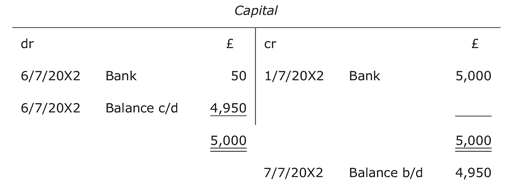Balancing your account is an essential task that ensures your finances are in order. It may sound tedious, but it is a crucial step in maintaining financial stability. In this article, we will guide you through the process of balancing an account and provide you with some useful tips and tricks to make it easier.
Table of Contents
What is Balancing an Account?
Balancing an account means reconciling the transactions in your account with your bank statement or financial records. This process helps you identify any discrepancies in your records and ensures that your account is accurate and up-to-date.
Why is Balancing an Account Important?
Balancing your account is important for several reasons. It helps you keep track of your finances, detect and correct errors, and avoid overdraft fees or other penalties. It also gives you a better understanding of your spending habits and helps you plan your budget accordingly.
How to Balance an Account
Balancing an account can be a simple process if you follow these steps:
Step 1: Gather Your Financial Records
The first step is to gather all your financial records, including your bank statements, receipts, checks, and any other documentation related to your account.
Step 2: Compare Your Records with Your Bank Statement
Once you have gathered all your financial records, compare them with your bank statement. Check each transaction in your bank statement against your records to ensure that they are accurate and match.
Step 3: Identify Any Discrepancies
If you come across any discrepancies or errors, identify them and make a note of them. This could include transactions that are missing, duplicated, or recorded incorrectly.
Step 4: Correct the Errors
Once you have identified the errors, correct them by making the necessary adjustments to your records. This may involve adding missing transactions or deleting duplicated ones.
Step 5: Reconcile Your Account
Once you have corrected all the errors, reconcile your account by comparing your adjusted records with your bank statement. If they match, your account is balanced. If not, repeat the process until your records match your bank statement.
Tips and Tricks for Balancing an Account
Here are some useful tips and tricks to make the process of balancing an account easier:
Use Accounting Software
Using accounting software, such as QuickBooks or Xero, can significantly simplify the process of balancing an account. These tools allow you to automate the process and reduce the risk of errors.
Keep Track of Your Transactions
Make sure to keep a record of all your transactions, including deposits, withdrawals, and purchases. This will help you reconcile your account more accurately and easily.
Balance Your Account Regularly
Make it a habit to balance your account regularly, at least once a month. This will help you detect any errors or discrepancies early on and avoid any potential penalties or fees.
Check Your Bank Statement Carefully
When you receive your bank statement, check it carefully and compare it with your records. Make sure to highlight any discrepancies or errors and follow up with your bank if necessary.
Conclusion
Balancing an account may seem daunting, but it is an essential task that ensures your financial stability. By following the steps we have outlined in this article, you can easily balance your account and avoid any potential errors or penalties. Remember to keep track of your transactions, use accounting software if necessary, and balance your account regularly to stay on top of your finances.
FAQs
- How often should I balance my account?
It is recommended to balance your account at least once a month to ensure accuracy and avoid any potential errors.
- What should I do if I find an error in my bank statement?
If you find an error in your bank statement, make a note of it and follow up with your bank to correct it.
- Is it necessary to use accounting software to balance an account?
No, it is not necessary, but using accounting software can significantly simplify the process and reduce the risk of errors.
- Can I balance my account manually?
Yes, you can balance your account manually, but it may be more time-consuming and prone to errors.
- What are the benefits of balancing an account?
Balancing an account helps you keep track of your finances, detect and correct errors, and avoid overdraft fees or other penalties. It also gives you a better understanding of your spending habits and helps you plan your budget accordingly.




